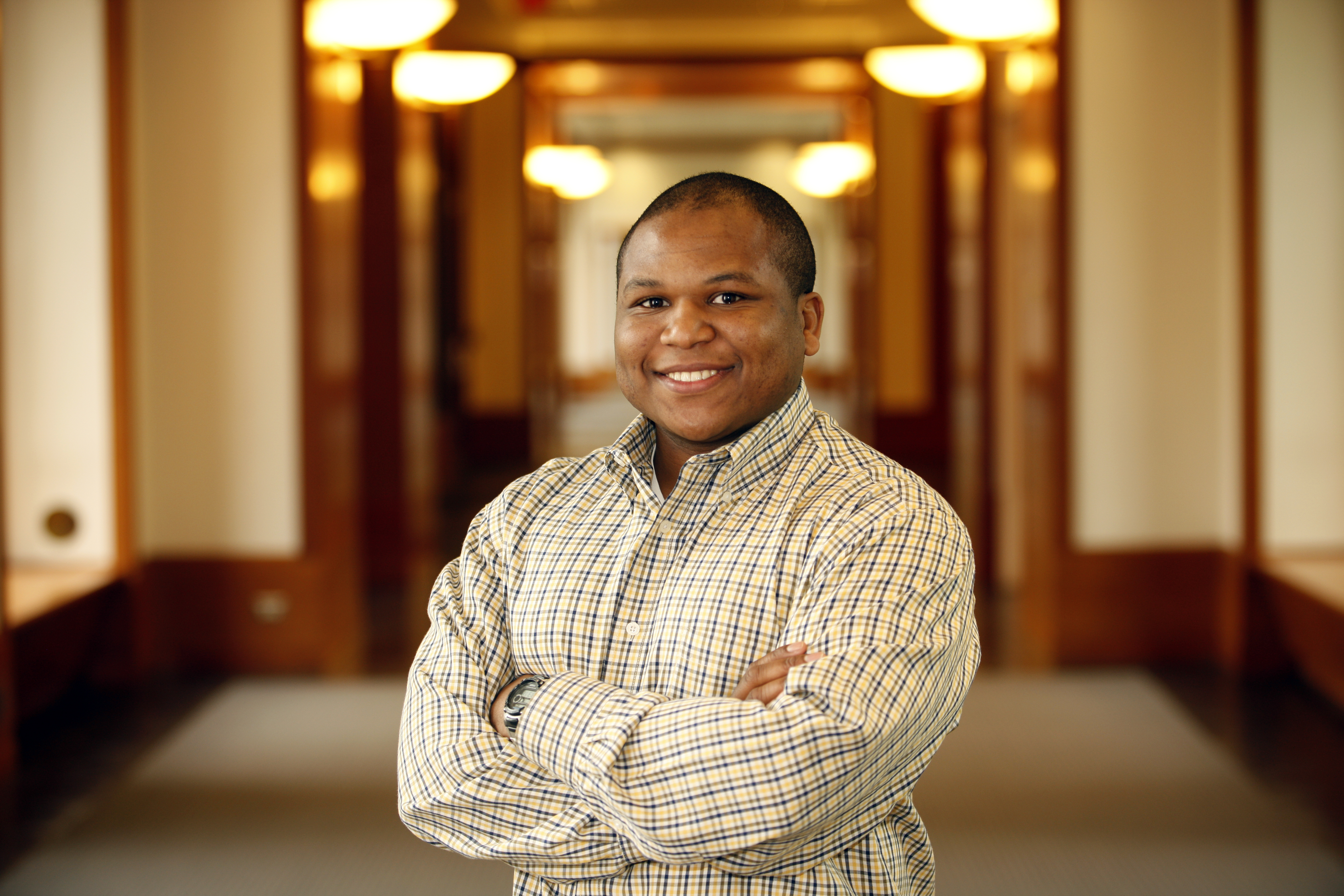May 14, 2012 — After graduating May 20 from the University of Virginia School of Law, Chris Wimbush plans to clerk for a judge on the U.S. District Court for the Eastern District of Virginia, a circuit nicknamed the "Rocket Docket" for its rapid handling of cases.
It's a prestigious job, but it also suits Wimbush's nature. In his three years at U.Va., he hurtled through an impressive list of activities, from organizing a business proposal competition to conducting research with professors. But his biggest impact may be in connecting the Law School community to high-profile policymakers who are focused on understanding how laws affect real people.
"It's very easy, when you get to this level of thinking about law, to lose sight of how the things that we worry about affect real people," Wimbush said. "I'd like to be good at helping both the lawyers and the policymakers understand how what they do affects ordinary people, and help non-lawyers understand our motivations as well."
As president of the Student Legal Forum, Wimbush helped facilitate intellectual discourse at the Law School by bringing prominent public figures to speak. The forum's list of speakers this year included former White House Counsel Robert Bauer, a 1976 U.Va. law graduate who is now general counsel to Obama's re-election campaign and the Democratic National Committee; former climate change czar Carol Browner, who headed the Environmental Protection Agency during the Clinton administration; and U.S. Immigration and Customs Enforcement Director John Morton, a 1994 U.Va. law alumnus.
The speakers helped give Wimbush a blueprint for the kind of lawyer he wants to be. "I'd like to be good at connecting the abstract of what we learn in law school to real life," he said.
Wimbush grew interested in becoming a lawyer fairly young. His father, who grew up in Martinsville, worked as in-house counsel for a string of food and beverage corporations across the country, including Hershey, Pillsbury ("Take your child to work day was amazing," Wimbush said), and the parent company to Guinness and other beverage subsidiaries.
Wimbush said he felt no pressure from his father to enter law. His own interest was sparked by watching President Clinton's second inauguration on TV in 1997. He soon began reading about government, the Cabinet and other topics.
"It definitely started with an appreciation for the process and the theater of politics," he said. "Over time, however, I began to realize that politics and policy were sort of the biggest way to have an impact, both positive and negative, as the last few years have shown." He liked the idea that "you can shape the rules and fashion them in a way that benefits huge chunks of society."
He majored in political science with a focus on public policy and a minor in psychology at George Washington University, where he interned at D.C. lobbying firms around the same time a number of lobbying-related scandals were brewing.
"I was able to think about those types of situations more thoughtfully because I had seen the other side of lobbying and knew there was a positive way to do it as well," he said. At his internships, he saw "good people advocating for what they believed in."
Wimbush said he particularly enjoys constitutional law and the pragmatic way it helps resolve tough questions.
"A lot of people say, 'Oh, it's just the justices making things up,'" he said. "I disagree. I think it's the justices making policy choices in some cases, and as someone who studied policy and appreciates the idea that you have to make choices and you have to draw lines and you have to make standards – and some people are going to like them and some people won't."
Working with professor Margaret Foster Riley, Wimbush wrote a 60-page paper on the Affordable Care Act's Independent Payment Advisory Board, dubbed by opponents as the "death panel" – a group of experts who make recommendations on reimbursements and what should be covered by Medicare and other government health programs.
"I push back and say that the government has always been involved in health care in a meaningful way, but health care continues to be a special area about which people are incredibly passionate and I wanted to take a look at why," Wimbush said.
Outside the classroom, he was submissions editor for the Virginia Journal of Law & Technology, and in his second year served as the career services chair for the Black Law Students Association. In the fall, he ran the Law School round of the U.Va. Entrepreneurship Cup, a business competition in which about 30 law students competed in teams and individually. The winning Law School team, which proposed a business plan to implement a water purification system they designed, won an honorable mention and a $5,000 prize in the University-wide competition.
Riley said she was amazed at Wimbush's level of engagement in law school life.
"I often didn't understand how he could do it all, but he actually did, and he did it well," she said. "He's interested in everything and he has a very strong sense of service, both generally in terms of public service, but also toward individual classmates. And he's just funny – he's fun to be with. He's someone you enjoy having lunch with and talking about everything."
Media Contact
Article Information
May 14, 2012
/content/class-2012-wimbush-leaves-law-school-bridge-builder-real-world-law

